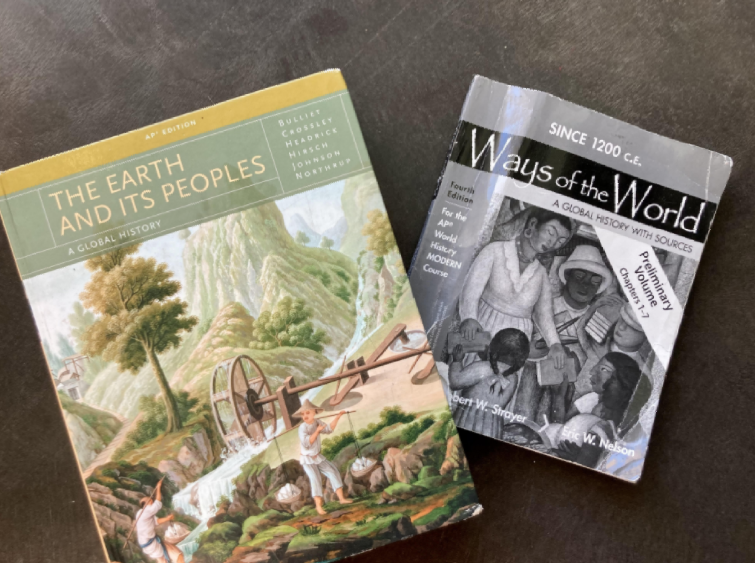AP World History is Still Too Eurocentric
The two textbooks used in Boulder High’s AP World History class.
Since the creation of the U.S. public school system, American children have been learning history through a European lens. The push for schools to feature history from different perspectives has started to gain traction and the College Board, the company that makes Advanced Placement (or AP) classes, is feeling the pull. However, despite their efforts, the College Board’s AP World History course is still extremely Eurocentric.
The content and tone of the textbooks used in World History show a heavy bias towards Europe. The first unit in Strayer and Nelson’s Ways of the World, the textbook which the College Board reviewed and approved for the exam, is included for the purpose of introducing students to world history in the time before European empires extended into the Americas. Despite its purpose, the textbook still manages to have something better to say about Europe. This is apparent in many ways, from how the authors exclude information about Sub-Saharan Africa prior to its first contact with other civilizations to how they manage to find the most tremendous silver linings to the Crusades, but not other events in the same time period. On page 83, the textbook reads, “the Crusades demonstrated a growing European capacity for organization, finance, transportation, and recruitment, made all the more impressive by the absence of any centralized direction for the project. They also demonstrated considerable cruelty.” However, on page 52, the book describes the influence of Chinese culture on Korean women as, “efforts to plant Confucian values and Chinese culture in Korea had what one scholar has called an ‘overwhelmingly negative’ impact on Korean women.” The textbook mentions the cruelty of the Crusades almost absentmindedly – describing this event in a way that is irresponsible and inaccurate. The Crusades were described as “ruthless” by onlookers and deeply damaged the relationship between Christians and Muslims, a rift which still has repercussions today. In an even more irresponsible manner, contrasted with this relatively light description of the Crusades, the textbook only depicts the negative effects of the Song Dynasty. Yet Chinese dynasties introduced Korea to philosophies and political organization—and while it wasn’t all good, the Crusades certainly weren’t either. To provide examples of supposed European ingenuity while not doing so for the Song Dynasty does not allow for an equal understanding of both events.
The supplemental videos provided for the course are no better. College Board has provided informational videos for the 2020-21 school year to reinforce topics that teachers might not be able to cover thoroughly due to the restrictions of online learning. While helpful in reviewing subjects, the videos continue favoritism of Europe by, for example, not including a lot of information about indigenous tribes in the Americas. The videos and textbooks cover the Inca and Aztec empires and slightly touch on the Mississippi River Valley Civilization, but leave out information about the hundreds of tribes in what is present-day South and North America. This not only is an inaccurate view of history, but it also affects how students view indigenous people in the United States today. Gian Mercurio, a former park ranger at Mesa Verde National Park and author of many books about tribes in the region, says that the ancestral Puebloan people traded with tribes all the way down to Central America. Mercurio said that “there is evidence of both macaw eggshells and feathers in ancestral Puebloan land,” and that “their bodies were ceremoniously buried.” There is also evidence of cacao and turquoise from trade with tribes in present-day Mexico. This trade was just as long and impressive as trade along the Silk Roads, so it does not make sense that the College Board teaches one and not the other. Not including historical evidence like this gives a one-sided view of the history of North America and helps students defend the unjust treatment of indigenous tribes in the United States and Canada to this day. The videos also give strange and borderline-inaccurate facts. Daily Video 1.6 (part 1), which is only available to those enrolled in AP World History, describes the persecution of Jews during the Bubonic Plague as “conflicts between Jews and Christians,” implying that the violence was two-sided when in reality, misconceptions about the origins of the plague led to many massacres of the Jewish people during the Black Death in Europe. This quote is just one example of the many questionable statements from these videos.
Despite all of this, the College Board occasionally seems to be trying to improve. They offered AP World History in 2002 after years of only teaching AP U.S. History and AP European History. When they announced they would be splitting AP World History into two classes, they listened to teachers and changed the dividing year to start before European empires and bloody conquests in the Americas. History cannot be written without mentioning Europe’s achievements, but to gloss over their failures and evils creates an “us vs them” mindset. The College Board needs to stop letting history be written from the perspective of the “winners.”
While there has been change, the class still sticks to its old ways. The College Board claims to provide “excellence and equity in education,” yet that does not take place in AP World History. How history is taught is of tremendous importance. Our knowledge of the past greatly influences our perception of the present and skewed representations of our history have drastic effects in our world. Looking at it with a victor and a loser in mind doesn’t provide the necessary context for thinking about solutions for the problems that stem from our history. Every year, studies come out that show Americans’ lack of knowledge about history. From slavery to the Holocaust, Americans demonstrate that they need history class to be factual and accurate, and the College Board is not providing that in their curriculum.

Hannah (rhymes with fauna!) Cohen is ecstatic to be working on the Owl for her third and final year. She loves stories in all their forms, but she mostly has opinions on obscure podcasts and which New York Times opinion columnists are defacing the good name of journalistic analysis. When not busy with stumbling through sheet music, editing nonfiction for jGirls+ Magazine, or seeking out the cheapest bluegrass venue, Hannah enjoys wandering around the mountains with her friends and lovely labradoodle. Although she's slightly preferential to the sweeter, more robust taste of red grapes, she knows that the bliss of biting into a crunchy grape transcends color.



Robert Barham • Apr 5, 2023 at 2:35 pm
I feel this piece neglects the complex nuances of historiography and the discussions that are currently taking place. AP World History (now AP World History: Modern) falls really more under the control of the ebbs and flows of academia than high school curriculum. As a professional historian, who has a graduate degree in history, I recognize the concerns, however, this is an issue too complex for those outside of academia, or at least those without a graduate training in historiography, to really be able to discuss with any amount of perspicacious resolution.
Lonewolf Publishing • Oct 7, 2020 at 1:58 pm
Thank you for speaking so clearly and persuasively about the slanted (Eurocentric) presentation of world history in our schools.
We have been publishing books on the native peoples of the American Southwest for 25 years. Their abilities and accomplishments are truly astounding, from genetics to chemistry to philosophy and social organization.
We truly appreciate your bringing this omission to the attention of the Boulder academic community. Keep up the good work!
Halie Leland • Oct 6, 2020 at 9:33 pm
I love this. I have been thinking about the exact same things this year in APWH. I think the curriculum glosses over way too many beautiful and important non-European civilizations and speaks of events in the early modern era of other regions of the world as largely an afterthought. Great and insightful article!